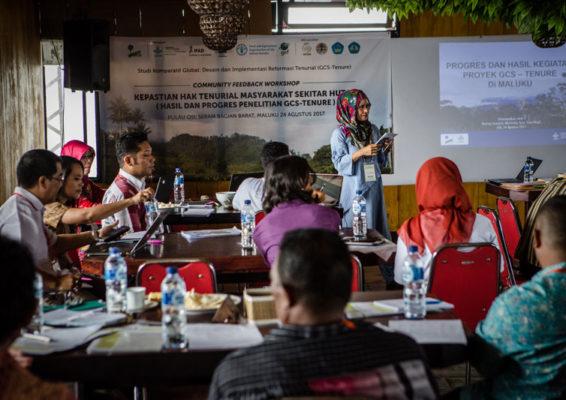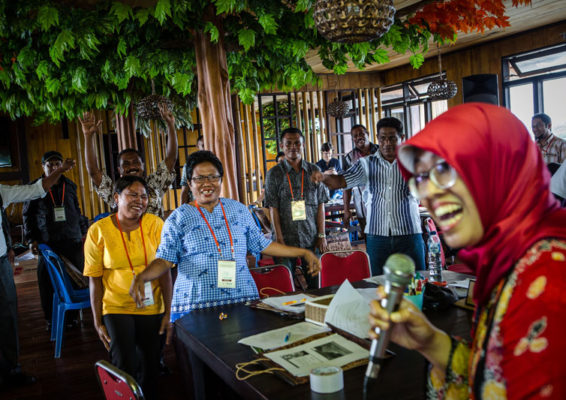This is the third of seven stories highlighting the recent publication of a special issue of the International Forestry Review focused on CIFOR research.
When CIFOR researcher Ade Tamara observes a multi-stakeholder forum (MSF) for the first time, she can see signs of good leadership—if it’s there. “Good leaders or facilitators accommodate different opinions,” she said. “They go out of their way to encourage quiet participants to share their thoughts.”
However, while “leadership is easy to see, trust is harder to detect,” she said. “And these two factors nurture collaboration in MSFs, which often handle complex problems involving stakeholders with conflicting interests.”
Tamara and CIFOR researchers Nicole Heise Vigil, Nining Liswanti and Shintia Arwida, examined three Indonesian MSFs to find out how trust building influences an MSF’s process and how leadership affects its outcomes.
Their findings, published in the International Forestry Review, revealed that forums require different kinds of leadership based on the context in which they are organized. They also found that trust among MSF participants and organizers is a key factor in an MSF’s success.
MSFs are , purposefully organized interactive processes that bring together stakeholders to participate in dialogue, decision-making and/or implementation regarding actions seeking to address a problem they hold in common or to achieve a goal for their common benefit, according to the scientists.
Proponents of MSFs argue that bringing different stakeholders to the same table may help solve complex environmental problems.
The team focused on three MSFs at the subnational level, all of which were set up to achieve sustainable land or resource use. They interviewed 131 stakeholders from government, NGOs (non-governmental organizations), the private sector, civil society organizations, local communities, and academia.
Their study presents an in-depth comparative analysis of these cases to understand the implications of trust and leadership in the MSFs’ ability to solve complex problems.
Case 1: In Jambi, a level playing field leads to trust-building
From 2000 to 2006, CIFOR, together with Jambi University and a local NGO, formed the Adaptive Collaborative Management Project (ACM) MSF to support communities in reducing deforestation and forest degradation. The ACM project succeeded in supporting the legal recognition of customary forests, leading to Indonesian President Joko Widodo’s 2017 commitment to devolve the ownership of those forests to communities.
During its formation, participants chose not to designate a leader. Many had worked together in the past and felt that shared leadership would encourage mutual cooperation and effective collaboration.
This leadership style was one among several strategies to prevent powerful stakeholders from dominating the MSF. In addition, the ACM held meetings in informal settings to encourage participation from less powerful stakeholders. They also held capacity development workshops for historically marginalized sectors, with a special focus on women. Study interviewees noted the workshops helped local participants voice their needs and interests with more confidence.
“I love the idea of collaborating as we did in Bungo, also through informal interactions prior to the formal forum,” one participant said in the study. “It enabled us to connect more easily with the government. We understood that we needed each other to do our job so that we could help the government to put together a program that was pro-conservation and environment and, at the same time, supported the marginalized community by providing them with useful capacities and information.”
Tamara noted that the ACM MSF is an example of how positive past collaborations, combined with efforts to level the playing field, contribute to trust-building and positively influence an MSF’s process and outcomes.
Case 2: A respected leader wins over ‘sectoral egos’ in East Kalimantan
Located in a province with land tenure conflicts, the MSF under East Kalimantan’s Regional Council on Climate Change has achieved much since it was established in 2011. These wins include better coordination among stakeholders and growing influence on the improvement of sustainable land and resource use policies. The MSF also helped strengthen climate change adaptation and mitigation processes by providing technical support to the provincial government.
Stakeholders in the MSF described their facilitator as unbiased, well-respected, and skilled in cross-sectoral coordination and conflict management. Research results showed high levels of trust among the MSF participants, which the researchers attribute to the group’s inclusivity and history of collaboration.
The researchers noted that the facilitator’s deftness in encouraging honest dialogue and creating consensus helped build trust towards himself and the MSF’s process. As one participant stated: “Relevant stakeholders were invited to the forum even though they were opposed to REDD+ implementation. The discussion was very open, with very hot debates on the pros and cons of REDD+.”
Interviewees said that having a well-respected leader at the helm also helped the group hurdle the challenges of ego sektoral (sectoral ego). In Indonesian language, the term refers to the self-importance a large institution exhibits during MSF proceedings, believing that they alone can credibly develop relevant policies and regulations.
The facilitator’s stature and collaborative nature allowed him to coordinate smoothly with different government agencies. One interviewee said that would not have been the case if the leader were connected to a government agency because sectoral ego would have slowed things down or even blocked cooperation.
“Sectoral ego has hindered the ability of government sectors in Indonesia to coordinate and collaborate,” Tamara said. “So, any cross-cutting issues that are meant to be solved through MSFs need to take this matter into account in their design.”
Case 3: Lack of trust and leadership clouds cooperation in West Java
Once described by the Asian Development Bank (ADB) as the “world’s dirtiest river,” the Citarum and its watershed supply water to about 25 million people in the province of West Java.
In the last several years, the Indonesian government declared the Citarum its most critical watershed and in need of immediate rehabilitation. Yet, garbage and industrial waste continue to pollute its waters and it remains unclear who is responsible for cleaning it up.
To coordinate action on the Citarum, ADB funded the formation of several MSFs at the national and subnational levels under the name Integrated Citarum Water Resources Management Investment Program. These MSFs were active between 2009 and 2014. This study analyzed one of the subnational MSFs held in West Java.
Interviews revealed that stakeholders at the national level struggled to build trust and cooperation among different government sectors and subnational stakeholders involved in the rehabilitation of the watershed. A participant noted that the MSFs were “influenced by political dynamics at the subnational level. Citarum is a cross region problem, there were a lot of different interests, and it was hard to synergize them.” The researchers found that although subnational support for the local communities’ transition to agroforestry was successful, there were no meaningful outcomes at the national level.
Interviewees felt that sectoral ego obstructed cooperation in the MSF. Institutions focused on their own plans and failed to coordinate with each other. This lack of synergy fostered distrust among participants, which in turn led to problems in data sharing and ultimately affected the MSF’s ability to meet its goals.
Overall, the MSF was disorganized and suffered from lack of clear leadership. One participant explained, “There are so many stakeholders involved and no leader providing clear guidance. As a result, there was still a lot of overlapping work among MSF participants. There were a lot of “wait and see” moments and, in the end, the coordination process failed.”
“The Citarum case showed a complex issue that required coordination with various sectors and governance levels. MSF participants also perceived the issue as highly politicized,” Tamara said. “Good leadership would have bridged sectoral ego among various institutions, and built a foundation for trust-building to develop collaboration among MSF participants.”

